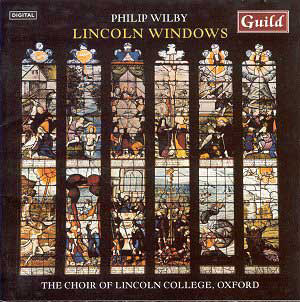Philip Wilby may be better-known for his many fine
works either for brass or wind bands, some of which have been recorded
some years ago. He also composed a great deal of choral music of which
the present release offers a comprehensive selection.
The Lincoln Windows were inspired by
the stained glass windows in Lincoln Chapel, Oxford. The Lincoln windows
have six panels, each sub-divised into a pair of related biblical scenes,
with Old Testament below and New Testament above: thus Christ’s Nativity
and the creation of Adam; Christ’s Baptism and the baptism of the forefathers
by Moses; the Last Supper and the rite of the passover; the Crucifixion
and the raising of Moses’ serpent staff; the Resurrection and Jonah
emergent from the whale; the Ascension of Christ and the ascension of
Elijah. So, the work’s structure reflects the windows’ juxtaposing of
Old Testament citations and New Testament reference, often taken from
three 17th Century divines, Lancelot Andrews, John Donne
and Jeremy Taylor. The variety of literary sources is matched by a widely
varied, though in no way eclectic, musical approach incorporating song
and speech, soloists and choir, the whole framed by the choral introduction
and its restatement in the closing section. The whole is an impressive
piece of some substance, though I for one feel that the Ascension section
fails to achieve the climax one might have expected. This is due (I
think) to the fact that this section relies more on speech than on song.
Nevertheless, this is a very fine piece of universal appeal.
The other items are shorter, occasional works though
they all are very fine in their simplicity. I particularly enjoyed the
delightful Goldfinch Carol with flute obbligato,
Wondrous Cross and the beautiful Sonnet
setting a fine poem by Mark Jarman. The a capella setting Evening
Liturgy is also very moving, for all its brevity and simplicity.
Three Preludes on English Tunes for
organ were partly composed in 1987. Recessional on "Michael"
takes as its inspiration Howell’s tune whereas Down Ampney
rhapsodises on Vaughan Williams’ great hymn tune.
Philip Wilby’s attractive and well-written music is
superbly served by these excellent performances and by a very fine recording.
The present release is up to Guild’s best standards. The production
is excellent, as usual, though I would have welcomed some more information,
such as dates of composition, on the works on offer.
Hubert Culot


![]() See
what else is on offer
See
what else is on offer 